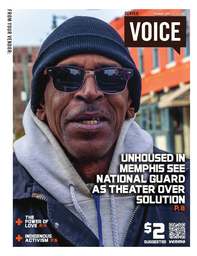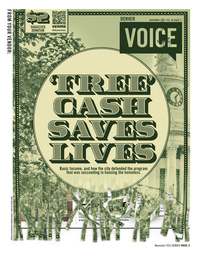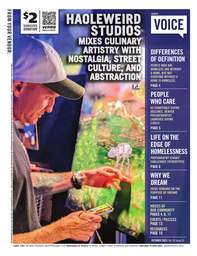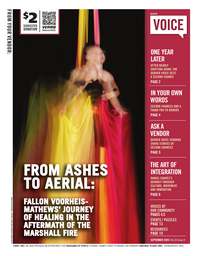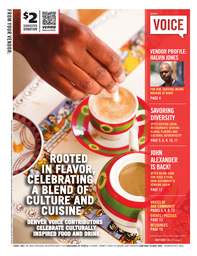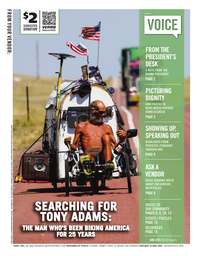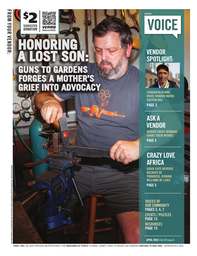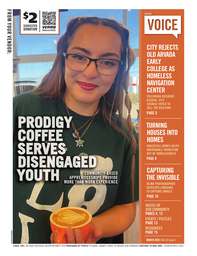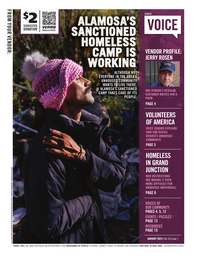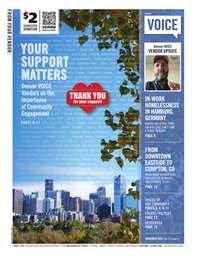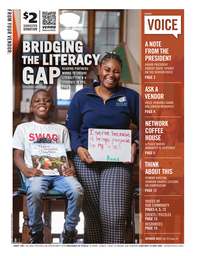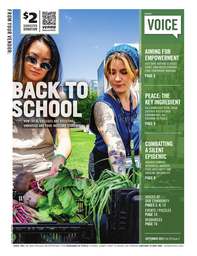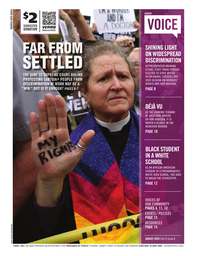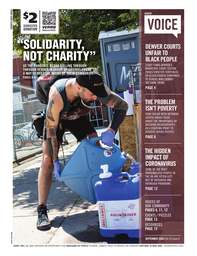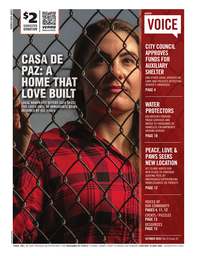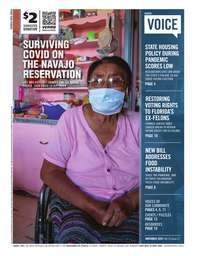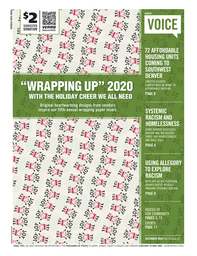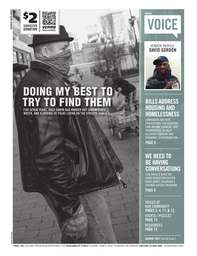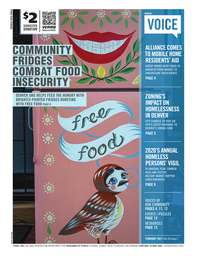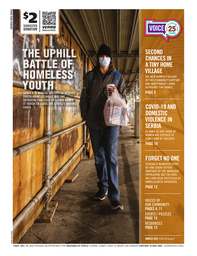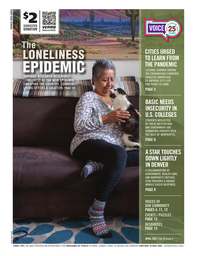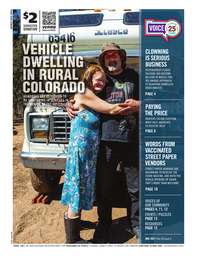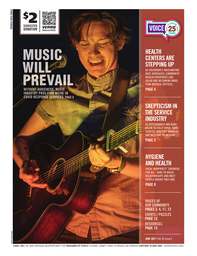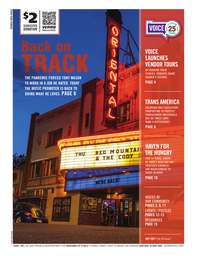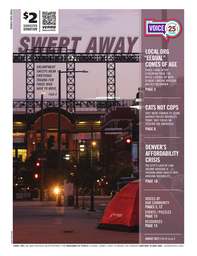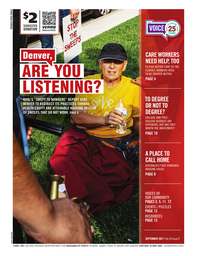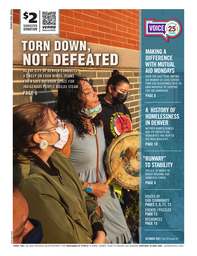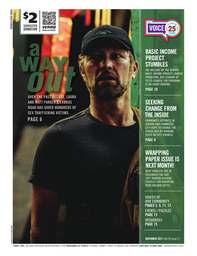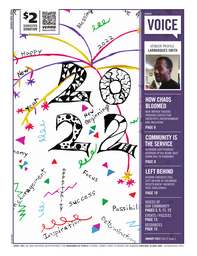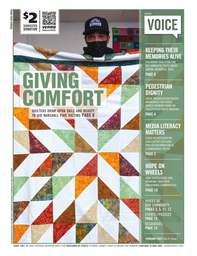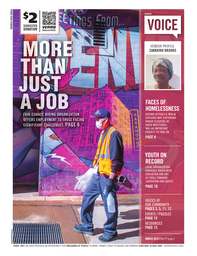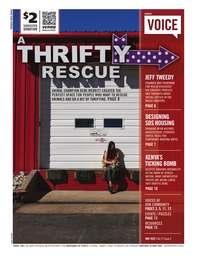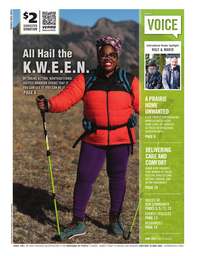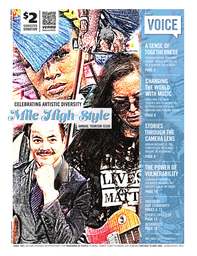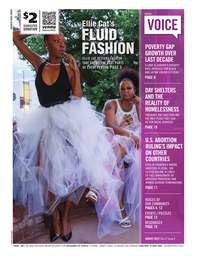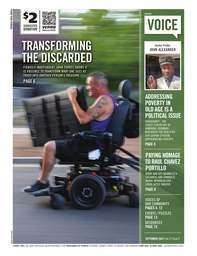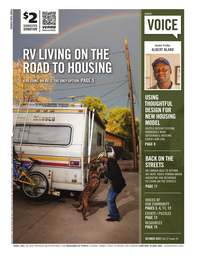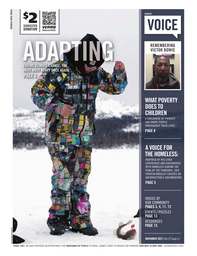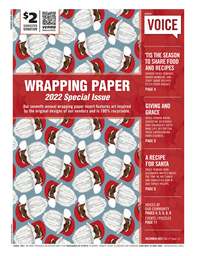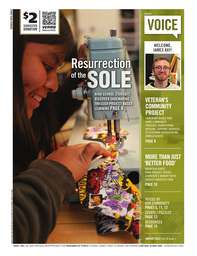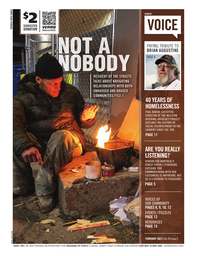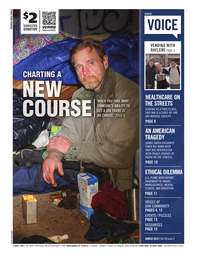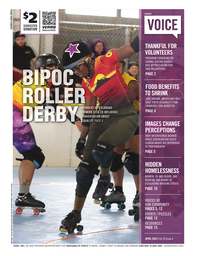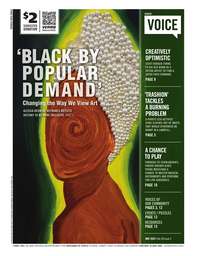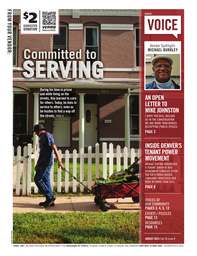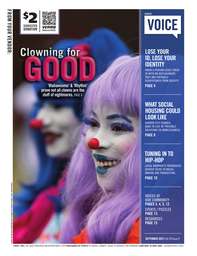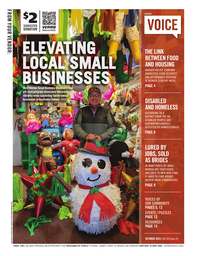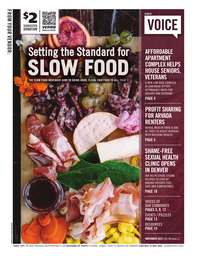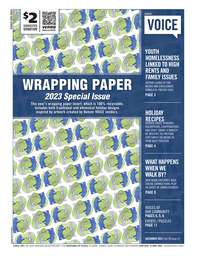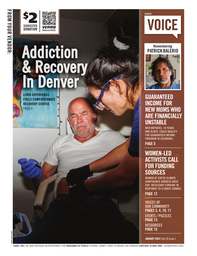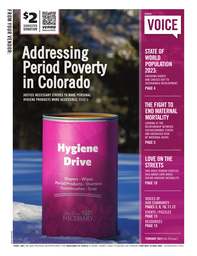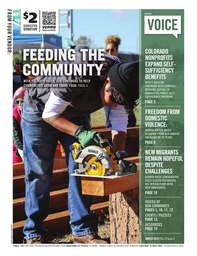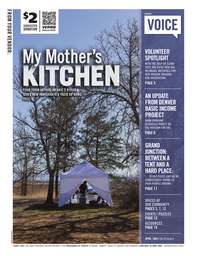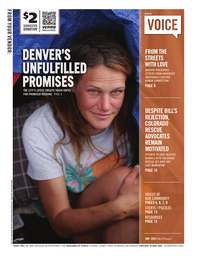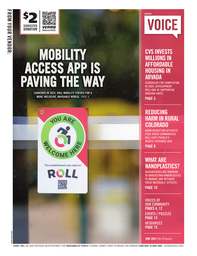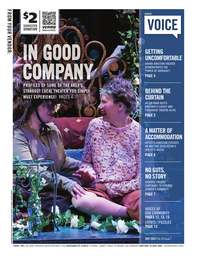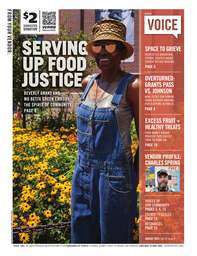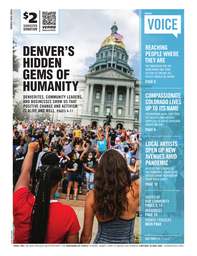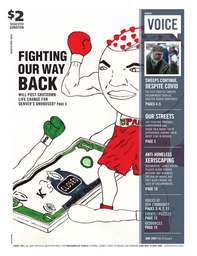DONOR LIST
WE LOVE OUR DONORS! WHEN YOU SUPPORT
THE DENVER VOICE, YOU ARE HELPING SUPPORT
HUNDREDS OF HOMELESS AND IMPOVERISHED
INDIVIDUALS WHO ARE WORKING TO REALIZE
SELF-SUFFICIENCY THROUGH EARNING A
DIGNIFIED INCOME. YOUR GIFT MAKES A WORLD
OF DIFFERENCE FOR THESE INDIVIDUALS. HERE,
WE LIST THOSE WHO HAVE GIVEN $500 AND MORE
IN THE LAST YEAR. DENVERVOICE.ORG/DONATE
$25,000+
Rose Community Foundation - CMP
The NextFifty Initiative
John & Laurie Mcwethy Charitable Fund
$10,000+
Max & Elaine Appel
The Christian Foundation
$5,000 - $9,999
CHFA Direct Effect
Anschut Family Foundation
Cranaleith Foundation, Inc
$1,000-$4,999
Russell Peterson
Bright Funds
Pivotal Energy Partners USA, Inc.
Jerry Conover
Jill Haug
Meek-Cuneo Family Fund
Paul Manoogian
Creating Healthier Communities
Sustainable Housing and Development Foundation
Keyrenter Property Management Denver
Sidney B and Caleb F Gates Fund
SEI Giving Fund
Walker Family Foundation
Benevity Communtiy Fund
Whole Foods Foundation
Kroger
The Credit Union of Colorado Foundation
Jana and Jim Cuneo
Matthew Rezek
Network for Good
Lori Holland
Megan Arellano and Paul Karolyi
Matthew Seashore
Michael Dino
Michael J. Fehn & Jan Monnier
Gaspar Terrana
Courage and Community Foundation
Jim Ashe
George Lichter Family Foundation
$500-$999
Christopher Boulanger
Lighthouse Writer’s Workshop, Inc.
Warren & Betty Kuehner
Fire on the Mountain
Alistair Davidson
Laura Wing
Michelle Stapleton & James Thompson
GivingFirst, Community First Foundation
Maggie Holben
Giles Clasen
Laura Saunders
WalMart
Ridley, McGreevy & Winocur
Cake Websites & More
10X Business Consultants
Barbara & Robert Ells
Stephen Saul
Jennifer Stedron
James Stegman
ABOVE THE FOLD: $5,000
• One complimentary full page ad in the newspaper ($1,000 value)
• Table of 10 and Sponsor recognition at annual Rise and Thrive Breakfast (200 attendees)
• Sponsorship recognition at our annual Pints Fighting Poverty event (200 attendees)
• Business logo highlighted on website homepage, and in the Above the Fold Sponsorship list
• Logo highlighted in our annual report, along with logo in quarterly support feature of the paper
SPONSORSHIP LEVELS
THE DENVER VOICE’S ANNUAL SPONSORSHIP SUPPORT LEVELS PROVIDE BUSINESSES LIKE YOURS THE OPPORTUNITY TO
INVEST IN WORK EMPOWERMENT, HOMELESS PREVENTION, THE CHALLENGING OF COMMUNITY PERCEPTIONS, AND TO
BE A PART OF PROVIDING OUR COMMUNITY WITH QUALITY AWARD-WINNING JOURNALISM THAT MAKES A DIFFERENCE
THROUGH OUR WRITERS AND VENDORS – AN INVALUABLE PART OF DENVER’S COMMUNITY.
YOUR INVOLVEMENT WILL HELP HIGHLIGHT THE IMPORTANCE OF TAKING POSITIVE ACTION TO COMBAT HOMELESSNESS
AND IMPOVERISHMENT. AS A SPONSOR, YOU HAVE A WAY TO REACH OUT TO THE COMMUNITY AND GIVE SOMETHING BACK
AT THE SAME TIME.
ANNUAL SPONSORSHIPS BENEFITS INCLUDE YOUR LOGO LISTED ON OUR WEBSITE HOMEPAGE, MONTHLY AD SPACE IN
OUR PAPER, AND SPECIAL EVENT PERKS FOR YOU AND YOUR EMPLOYEES ALL YEAR LONG. IT’S A GOOD DEAL FOR A GOOD
CAUSE, AND YOUR GIFT IS 100% TAX-DEDUCTIBLE!
GALLEY: $2,500
• One complimentary half page ad in the newspaper ($600 value)
• Table of 10 and Sponsor recognition at annual Rise and Thrive Breakfast (200 attendees)
• Sponsorship recognition at our annual Pints Fighting Poverty event (200 attendees)
• Business logo highlighted on website homepage, and in the Galley Sponsorship list
• Logo highlighted in our annual report, along with logo in quarterly support feature of the paper
HONOR BOX: $1,000
• Table of 10 and Sponsor recognition at annual Rise and Thrive Breakfast (200 attendees)
• Sponsorship recognition at our annual Pints Fighting Poverty event (200 attendees)
• Business logo highlighted on website homepage, and in the Honor Box Sponsorship list
• Logo highlighted in our annual report, along with logo in quarterly support feature of the paper
FLY SHEET: $500
• Two complimentary tickets to our annual Pints Fighting Poverty event ($50 value)
• Business logo highlighted on website homepage, and in the Fly Sheet Sponsorship list
• Logo highlighted in our annual report, along with logo in quarterly support feature of the paper
14 DENVER VOICE June 2022
RESOURCE LIST
FOR HOMELESS INDIVIDUALS IN DENVER
DENVERVOICE.ORG/RESOURCE-LIST
DIAL 211 FOR A MORE COMPLETE LIST OF RESOURCES IN ENGLISH AND SPANISH. PROVIDES INFORMATION FOR FOOD, MEDICAL CARE, SENIOR SERVICES, YOUTH PROGRAMS,
COUNSELING, EDUCATION, SHELTERS, SUBSTANCE ABUSE, HOLIDAY ASSISTANCE, AND MORE. EMAIL EDITOR@DENVERVOICE.ORG WITH CORRECTIONS OR ADDITIONS.
FREE MEALS
AGAPE CHRISTIAN CHURCH 2501 California St., Sat., 11am
CAPITOL HEIGHTS PRESBYTERIAN CHURCH 1100 Fillmore St., Sat. lunch at 11:30am capitolheightspresbyterian.org
CAPITOL HILL COMMUNITY SERVICES Go to mealsforpoor.org for meal locations
CATHEDRAL OF THE IMMACULATE CONCEPTION 1530 Logan St.; sandwiches & coffee Mon.-Fri. 8:30am
denvercathedral.org
CHRIST’S BODY MINISTRIES 850 Lincoln; Mon. closed, Tues.-Thurs. 10am-3pm, Fri. 8am-11pm; groceries &
hot meal on Sat. at 2pm (at 16th & York); Sun. church service at 6pm, dinner at 7pm. christsbody.org
CHRIST IN THE CITY Home-cooked meal; Civic Center Park at Colfax & Lincoln at 1pm every Wed. & 2nd Sat.
christinthecity.org
CITYSQUARE DENVER 303-783-3777, 2575 S. Broadway; Food pantry Tues. 10am-6pm citysquare.org
CAPITOL HILL COMMUNITY SERVICES Hot meals served at 1820 Broadway (in front of Trinity United Methodist
Church), Mon., Tues., Thurs., Fri. 11:45-12:15 mealsforpoor.org
DENVER INNER CITY PARISH 303-322-5733, 1212 Mariposa St., VOA Dining Center for Seniors, free 60 yrs and
older, Wed.-Sat. 9am-12pm. Food Bank, Wed.-Fri., tickets at 9am, food bank open 10am-12pm. dicp.org
DENVER RESCUE MISSION 1130 Park Avenue West, 3 meals 7 days/week: 5:30am, 12pm, 6pm 303-294-0157
denverrescuemission.org
FATHER WOODY’S HAVEN OF HOPE 1101 W. 7th Ave. 303-607-0855. Mon.-Fri. 7am-1pm. Not open weekends.
Breakfast is at 8am, and lunch is served at 11am frwoodyshavenofhope.org
FEEDING DENVER’S HUNGRY Food service on the second and fourth Thurs. of each month; locations found at
feedingdenvershungry.org/events.html
FOOD NOT BOMBS Wed. 4pm/Civic Center Park facebook.com/ThePeoplesPicnic
HARE KRISHNA TEMPLE 1400 Cherry St., free vegetarian feast on Sun., 6:45-7:30pm krishnadenver.com
HIS LOVE FELLOWSHIP CHURCH 910 Kalamath, community dinner on Thurs., 6-6:45pm, men’s breakfast 1st Sat.
of the Month, 8-10am, women’s breakfast 2nd Sat., 9-11am. hislovefellowship.org
HOLY GHOST CATHOLIC CHURCH 1900 California St., sandwiches, Mon.-Sat., 10-10:30am holyghostchurch.org
JORDAN AME CHURCH 29th and Milwaukee St., Tues. lunch 11:30am-1:00pm jordanamedenver.churchfoyer.com
OPEN DOOR MINISTRIES 1567 Marion St., Sat. morning breakfast: 8am, Sun. dinner (required church
attendance at 4:30pm) meal served at 6pm. 303-830-2201 odmdenver.org/home
ST. CLARE’S MINISTRY AT ST. PETER AND ST. MARY 126 W. 2nd Ave., dinner at 4pm on Tues. Also offer a change of
clothes, toiletries and sleeping bags when available. 303-722-8781 stpeterandmary.org
ST. ELIZABETH’S Speer Blvd. & Arapahoe St. on Auraria campus, 7 days/week, 11:00am; food, coffee.
stelizabethdenver.org
ST. FRANCIS CENTER 2323 Curtis St., Wed. & Fri. 3-4:30pm (except third Wed. of each month). sfcdenver.org
ST. PAUL’S LUTHERAN 1600 Grant St., Street Reach meal Mon. 1-4:30pm. Grocery room open at 11:30am every
Mon. saintpauldenver.com
SAME CAFÉ 2023 E. Colfax Ave. Restaurant serving mostly organic food—not free, but pay what you can or
work off your meal in the kitchen: Open Mon.-Sat., 11am to 2pm, Closed Sun. & holidays, 720-530-6853
soallmayeat.org
SENIOR SUPPORT SERVICES 846 E. 18th Ave. 3 meals, Mon.a-Fri. 7am-7pm; Sun. 11am-4pm. 55+
seniorsupportservices.org/programs
URBAN OUTREACH DENVER 608 26th St., Thurs. dinners, 6pm-7pm lovedenver.org
VOLUNTEERS OF AMERICA 2877 Lawrence St., breakfast (8am), lunch (11:30am), dinner (5pm) Mon.-Thurs.,
12pm on Fri., 1pm on Sun. Food & clothing bank 9:30am-4pm Mon.-Thurs.
voacolorado.org/gethelp-denvermetro-foodnutrition-themission
CAREER SERVICES
COMMUNITY TECHNOLOGY CENTER Level 4, Denver Central Library, 14th Ave. & Broadway. 720-865-1706.
Hours: Mon. & Tues. 10am-8pm; Wed., Thurs., Fri. 10am-6pm; Sat. 9am-5pm & Sun. 1-5pm; FREE services
include computer/internet use, wifi, computer classes, job search/resume classes and one-on-one tech help
appointments. denverlibrary.org/ctc
THE WESTSIDE ONE-STOP CAREER CENTER Denver Department of Human Services, 1200 Federal Blvd., Mon.Fri.,
7:30am-4:30pm; Services include: employment counseling, assisted job search, résumé preparation,
job/applicant matching, phone bank for calling employers, access to computers, copiers, fax, etc.
careercenteroffices.com/center/231/denver-westside-workforce-center
MEDICAL & DENTAL SERVICES
ACS COMMUNITY L.I.F.T. CareVan at Open Door Ministries, 1567 Marion St., Tues. 9am-12:30pm
DENVER HEALTH MEDICAL CENTER 303-436-6000, 777 Bannock St. denverhealth.org
DRUG REHAB USA Addiction hotline: 866-716-0142. Organizations that take Medicaid:
https://drugrehabus.org/rehabs/treatment/medicaid/united-states/colorado/denver
HARM REDUCTION ACTION CENTER 303-572-7800; 112 E. 8th Ave.; Mon.-Fri., 9am-12pm. HIV/Hep C/
Gonorrhea/ Chlamydia testing available. Our services are restricted to active IV Drug Users. Offers clean
syringes to active users, as well as safety training on how to properly dispose of dirty syringes.
harmreductionactioncenter.org
LIVER HEALTH CONNECTION 1325 S. Colorado Blvd., Suite B302. Resources and support for those affected by
Hep C. Free Hep C testing offered. 800-522-4372, info@hepc-connection.org, liverhealthconnection.org
INNER CITY HEALTH CENTER 303-296-1767, 3800 York St. Mon., Wed.-Fri. 8am-5pm; Tues. 9am-5pm;
Sat. 8am-2pm. Emergency walk-ins.
SALUD CLINIC 6075 Parkway Drive, Ste. 160, Commerce City; Dental 303-286-6755. Medical 303-286-8900.
Medical Hours: Mon.-Wed. 8am-9pm, Thurs.-Fri. 8am-5pm; Sat. (Urgent Care only) 8am-5pm;
Dental Hours: Mon.-Fri. 8am-5pm; Pharmacy Hours: Mon.-Fri. 1-5pm; After Office Hours: 1-800-283-3221
saludclinic.org/commerce-city
STOUT STREET CLINIC 303-293-2220, 2130 Stout St. Clinic hours for new and established patients: 7am-4pm
Mon., Tues., Thurs., & Fri. The clinic is open Wed. 11am-7pm. coloradocoalition.org/healthcare
SUNSHINE BEHAVIORAL HEALTH (YOUTH SERVICES) Services for youth facing substance abuse, addiction, mental
health disorders, or a combination of these conditions. 833-931-2484 sunshinebehavioralhealth.com
VA MEDICAL CENTER 303-399-8020, 1700 N Wheeling St., Aurora va.gov/find-locations/facility/vha_554A5
WORKNOW 720-389-0999; job recruitment, skills training, and job placement work-now.org
DROP-IN & DAYTIME CENTERS
ATTENTION HOMES 303-447-1207; 3080 Broadway, Boulder; contactah@attentionhomes.org. Offers safe shelter,
supportive programming, and other services to youth up to age 24 attentionhomes.org
CITYSQUARE DENVER 303-783-3777; 2575 S. Broadway; Mon.-Thurs. 10am-2pm, Denver Works helps with
employment, IDs, birth certs; mail services and lockers citysquare.org
FATHER WOODY’S HAVEN OF HOPE 303-607-0855; 1101 W. 7th Ave.; Mon.-Fri. 7am-1pm. Six private showers &
bathrooms, laundry, lunch & more thoh.org
THE GATHERING PLACE 303-321-4198; 1535 High St.; Mon., Wed.-Fri. 8:30am-5pm, Tues. 8:30am-1:30pm.
Daytime drop-in center for women, their children, and transgender individuals. Meals, computer lab, phones,
food bank, clothing, art programs, GED tutoring, referrals to other services, and more. tgpdenver.org
HARM REDUCTION ACTION CENTER 303-572-7800, 231 East Colfax; Mon.-Fri. 9am-12pm. Provides clean
syringes, syringe disposal, harm-reduction counseling, safe materials, Hep C/HIV education, and health
education classes. harmreductionactioncenter.org
HOLY GHOST CATHOLIC CHURCH 1900 California St., help with lost IDs and birth certificates holyghostchurch.org
HOPE PROGRAM 303-832-3354, 1555 Race St.; Mon.-Fri. 8am-4pm. For men and women with HIV.
LAWRENCE STREET COMMUNITY CENTER 2222 Lawrence St.; 303-294-0157; day facility, laundry, showers,
restrooms, access to services homelessassistance.us/li/lawrence-street-community-center
OPEN DOOR MINISTRIES 1567 Marion St.; Mon.-Fri. 7am-5:30pm. Drop-in center: bathrooms, coffee/tea,
snacks, resources, WIFI odmdenver.org
ST. FRANCIS CENTER 303-297-1576; 2323 Curtis St. 6am-6pm daily. Storage for one bag (when space is
available). Satellite Clinic hours- Mon., Tues., Thurs, Fri. 7:30am-3:30pm; Wed. 12:30-4:30pm sfcdenver.org
SENIOR SUPPORT SERVICES 846 E. 18th Ave. For those 55 and older. TV room, bus tokens, mental/physical
health outreach, and more. seniorsupportservices.org
SOX PLACE (YOUTH SERVICES) 2017 Larimer St. Daytime drop-in shelter for youth 12-30 years old. Meals, socks,
clothing bank, personal hygiene supplies, internet access, intentional mentoring and guidance, crisis
intervention, referrals to other services. Tues.-Fri. 12-4pm & Sat. 11-2pm. soxplace.com
THE SPOT AT URBAN PEAK (YOUTH SERVICES) 2100 Stout St. 303-291-0442. Drop-in hours Mon.-Fri. 8-11am. If
you are a youth aged 15-20 in need of immediate overnight shelter services, please contact 303-974-2928
urbanpeak.org/denver/programs-and-services/drop-in-center
URBAN PEAK (YOUTH SERVICES) Youth 14-24 in Denver and Colorado Springs. Overnight shelter, food, clothing,
showers, case workers, job skills and training, ID and birth certificate assistance, GED assistance, counseling
and housing. 730 21st St. 303-974-2900 urbanpeak.org
June 2022 DENVER VOICE 15
DON’T LOOK NOW!
PUZZLES ARE ON PAGE 13
